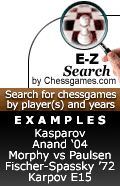BY: BOBBY ANG
(As published in Chess Piece, BusinessWorld, 22 March 2010)
Having written about the historic 1973 Leningrad Interzonal last week, it brought back some memories of a column I have always been wanting to write but have not found the right opportunity to do so. This may be it.
Most of us have seen First Knight, right? A retelling of the love story of Sir Lancelot and Queen Guinevere starring Sean Connery, Richard Gere and Julia Ormond -- it is a great movie. In the opening scene Richard Gere (Lancelot) was making some money by challenging bystanders in a town square to beat him in swords for a wager. After a particularly brilliant display his opponent asked him to give a few pointers on swordsmanship. Richard Gere obliged:
(1) First you have to study the moves of your opponent and anticipate what he will do before he does it;
(2) Second, there is a moment in any sword fight which will make the difference between winning and losing -- you have to learn to wait for it; and most important,
(3) You must not care if you live or die.
Equating this to chess, you have to prepare for your opponents, you have to learn to identify that crucial point in the game where you have to concentrate all your resources for it will determine whether you win or lose (Kasparov made a similar advice in one of his lectures), and you must not care whether you win or lose the game -- no short draws, keep going at your opponent until he (or you) errs.
Ignacio Dee, one of our best chess journalists around (I feel a particular sympathy for him, for he, like me, did not content himself with writing about chess -- he actually captained our national team in some international competitions) called me up one day to ask what I felt about Wesley So’s occasional short draws in competition. His opinion was that this tendency is holding Wesley back in his chess development. Now, of course, writing about playing to win is much much easier than actually playing chess over the board, but I was of a similar mind -- Wesley is too young to be agreeing to short draws. Leave the conserving of energy to people like Eugene Torre who cannot sustain their stamina over the entire course of a tournament -- when you are 16 years old, full of energy and in good physical shape you should go for the throat in every game.
The greatest exponent of this approach is, of course, Veselin Topalov. Long after his opponent’s mind had already mentally chalked up the half point and is signing off with thoughts of going to bed, Topalov is still cooking up some obscure tactics and traps to defeat him.
During his peak years one of the greatest practical players was Anatoly Karpov. Alexander Roshal, one of the most respected Soviet journalists (may his soul rest in peace) once wrote that in his opinion the greatest chessplayer in history is Garry Kasparov, but the greatest player (without the chess in front) is undoubtedly Karpov.
Why does he say that? Well, Karpov does everything in his power to beat you. Aside from his chess technique, which is one of the greatest ever, he resorts to "tricks." One example: he will deliberately leave himself with only a minute or so for his last few moves before the time control at the 40th move. Usually this would be in a complicated position, and during this long think he would analyze everything out. Just when his opponent thinks that Karpov is going to lose on time he would suddenly blitz out his moves with high speed. The opponent, flustered, would keep pace and before he knows it would blunder everything away.
Karpov would even refuse a draw offer in an inferior position. He is completely aware of all his weaknesses, of course, but when he does not see a way for the opponent to make progress Karpov would continue playing on the theory that, being the better player, the longer the game the more chances his opponent has of erring. And it often works.
Anatoly Karpov tied for first in the 1973 Leningrad Interzonal to qualify for the Candidates’ matches, which in turn led to his claiming the world crown in 1975 with Bobby Fischer defaulted. The following game against the Czech Jan Smejkal was a crucial victory over a top contender.
Smejkal, Jan (2570) -- Karpov, Anatoly (2645) [B49]
Leningrad Interzonal (16), 25.06.1973
REQUIRES JAVA
Monday, March 22, 2010
Not caring
Posted by
RUSTICBULL
at
9:20 PM
![]()
Subscribe to:
Post Comments (Atom)



1 Comment:
Nice write-up as usual by the illustrious Bobby Ang! Yes, young players should have the 'killer's instinct' to go for the jugular!
Post a Comment